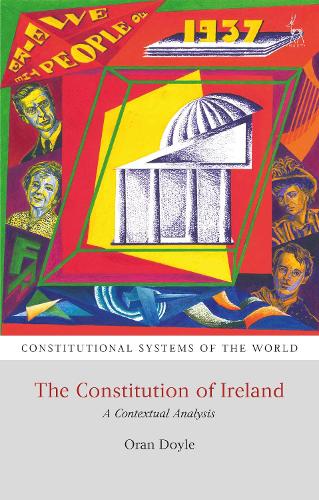
The Constitution of Ireland: A Contextual Analysis
(Paperback)
Publishing Details
The Constitution of Ireland: A Contextual Analysis
By (Author) Dr Oran Doyle
Bloomsbury Publishing PLC
Hart Publishing
29th November 2018
United Kingdom
Classifications
Tertiary Education
Non Fiction
Comparative law
342.417
Physical Properties
Paperback
256
Width 137mm, Height 211mm, Spine 13mm
340g
Description
This book provides a contextual analysis of constitutional governance in Ireland. It presents the 1937 Constitution as a seminal moment in an ongoing constitutional evolution, rather than a foundational event. The book demonstrates how the Irish constitutional order revolves around a bipartite separation of powers. The Government is dominant but is legally constrained by the courts, particularly in their interpretations of the fundamental rights protected by the Constitution. In recent decades, the courts have weakened the constitutional constraints on the Government. Political constraints imposed by opposition parties in Parliament and new accountability institutions (such as the Ombudsman) have moderately strengthened but the Government remains by far the most powerful political actor. There is a risk that such executive dominance could lead to democratic decay; however, the referendum requirement for constitutional amendment has prevented Governments from accumulating greater constitutional power. The book begins with an overview of Irish constitutional history leading to the enactment of the 1937 Constitution, before exploring the foundational decisions made by the Constitution in relation to territory, people and citizenship. Particular attention is paid to the constitutional relationship with Northern Ireland, currently unsettled by the decision of the United Kingdom to leave the European Union. The book details the key institutions of state (Government, Parliament, President and courts), before analysing how different constitutional actors exercise their respective powers of governance, contestation and oversight. A thematic approach is taken to the courts interpretation of fundamental rights, showing how judicial attitudes have markedly changed over time. Further attention is paid to both formal amendment and informal constitutional change. The Constitution today is markedly different from 1937: it is non-committal on national reunification, less influenced by Roman Catholic natural law teaching, and generally more permissive of Government action. It is perhaps these developments, however, that explain its continued success or, at least, its longevity.
Reviews
The Constitutional Systems of the World series aims to provide interested readers with accessible volumes that outline the historical, political and legal context that gives life to the bare texts of national constitutions. The Irish contribution to this series succeeds in fulfilling all of these objectives. -- Thomas Mohr, University College Dublin * The Irish Jurist *
The Constitution of Ireland: A Contextual Analysis offers a timely interdisciplinary analysis which will be of interest to lawyers, social scientists and other scholars with an interest in Irish public life, as well as interested general readers. It would be ideal for undergraduate and introductory law school courses on Irish and comparative constitutional law; and ideally it will contribute to establishing a tradition of contextual research on Irish constitutional law. -- Tim Murphy * Studies *
Oran Doyles contribution to Harts Constitutional Systems of the World series should be read by anyone with an interest in Irish constitutional law and also by comparative constitutional lawyers. -- Paul Daly, University Research Chair in Administrative Law and Governance, University of Ottawa * ICONnect *
Author Bio
Oran Doyle is Associate Professor of Law at Trinity College Dublin.
